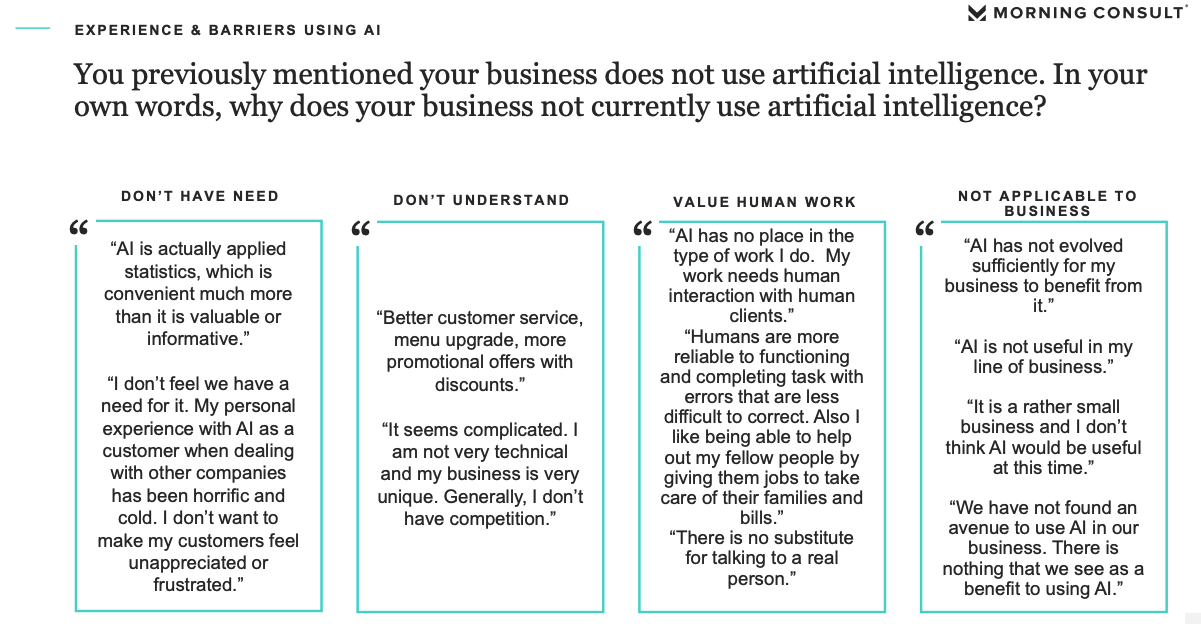SMEs struggle to implement AI - Here's why
While AI promises to reshape economies, its adoption by small and medium-sized businesses remains stubbornly uneven. Is this simply a matter of resources, or are there deeper, more complex factors at play? The truth is, there are several factors that make it hard for SMEs.
In this blog post, we'll take a look at five barriers that, in my opinion, are the biggest obstacles preventing SMEs from adopting AI.
Limited budgets and high costs for AI implementations
Smaller businesses (less than 250 employees) face significant hurdles due to limited budgets and the high cost of AI technologies.
This leads to a stark contrast: only 14% of small businesses are using AI, compared to 34% of medium and large businesses. The main reason is the pressure of tight margins, with around half planning to avoid investing in AI because of it. Plus, the cost of the AI tools themselves is a major concern for 45% of these companies.
All this makes it hard for them to stay competitive in a world where AI is becoming a key player.
Lack of knowledge and expertise
Besides money, SMEs are stuck with a three-part problem:
- they don’t have the tech experts,
- their employees aren’t digitally savvy enough,
- and there’s barely any research out there that’s actually focused on their specific needs.
Then there's the lack of examples of SMEs using AI. Most small business owners I talk to either vastly overestimate the capabilities of AI, or they say "I don't think AI can help us".
On top of that, when they think about AI adoption, 47% of them say they need financial help more than they need technical assistance (which only 34% prioritize). It's just another reminder that the money issue comes first for these businesses.
Technological challenges
Then there are the technical challenges.
Legacy IT systems don't play well with AI, leading to expensive integration issues. Data silos make it difficult to build complete AI solutions, and privacy concerns add uncertainty about how data can even be used. What's more, SMEs often don't know which AI tools to choose because the whole landscape is so complicated.
And new legislation such as the EU AI Act only makes it harder for them to access the latest AI models and tools, adding to the complexity.
Internal resistance and organisational barriers
A big hurdle for SMEs is internal resistance, driven by a lack of trust and understanding of AI.
People are skeptical—either because they don’t know enough about it, had bad experiences with past IT projects, or think it’s just too complicated. Employees worry AI could replace their jobs, so they’re not exactly eager to get on board. That’s why leadership has to step up, show the benefits of AI, tackle those fears, and offer proper training to make sure the transition goes smoothly.
83% of AI Achievers have CEO and senior sponsorship. Accenture - The art of AI maturity
Complexity and uncertainty in ROI assessment
Complexity around AI is the last of your five barriers.
The whole "black box" issue—where no one really knows how AI algorithms work—makes it feel risky and overwhelming for SMEs. On top of that, implementing AI into existing systems and adapting it for specific business need takes expertise and resources that most SMEs just don’t have. The long wait for ROI (sometimes two years or more) doesn’t help either, since smaller businesses are focused on short-term gains.
And hearing about AI failures, like botched chatbot projects, only adds to the doubt around AI's actual benefits.
Are you interested in using AI in your business? I support entrepreneurs to adopt AI and build AI-based solutions. Just drop me a message and let's talk.
Sources:
